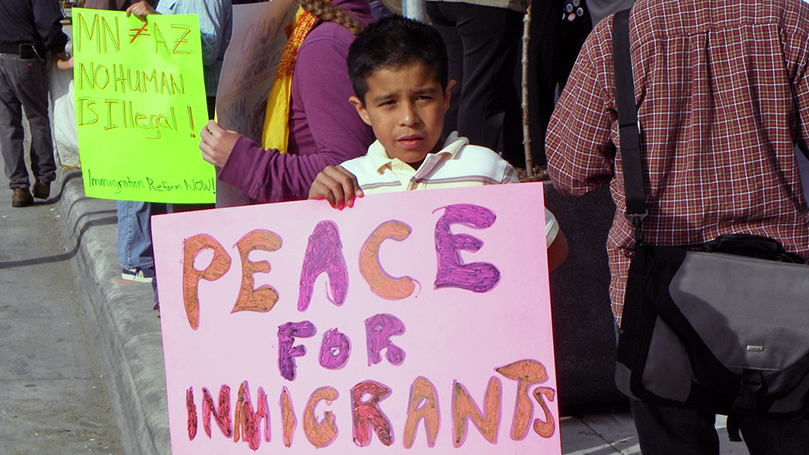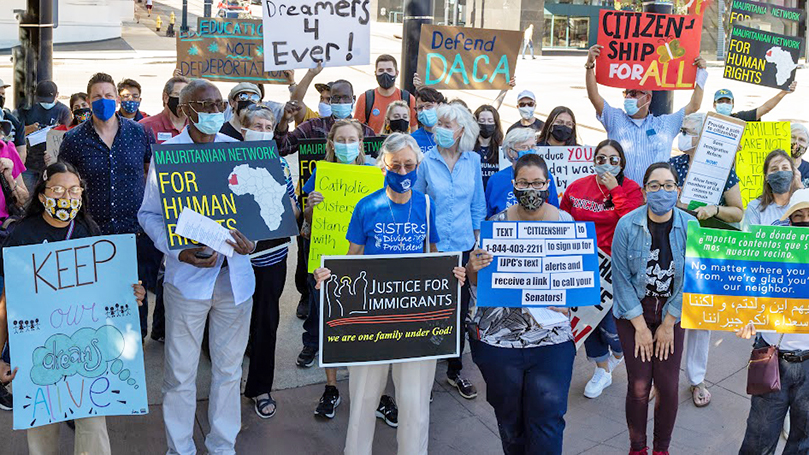
The following presentation was given by Debra Wilmer on behalf of the Immigration Subcommittee of the CPUSA Politcal Action Commission at the party’s 2023 peace conference in New York City.
Immigration to the U.S. and globally today is fueled by the policies of imperialism, global climate change (itself a product of imperialist policy), extreme poverty, and political violence and corruption. The latter are also often caused by the politics of imperialism.
We are seeing greatly increased numbers of people migrating from Venezuela to the U.S., from 4,500 in fiscal year 2020 to over 265,000 so far in 2023. Why is this? Sanctions against the government of Venezuela by the U.S. have severely impacted the economy there. How have U.S. sanctions and U.S. intervention in electoral politics impacted the Venezuelan economy?
U.S. sanctions on Venezuela have been in place since 2005. Since 2017, Trump-imposed sanctions have largely blocked state-run oil company PDVSA from exporting to its chosen markets. That changed recently, but Washington’s six-month relaxation of the measures is too limited to spur new crude production. Sanctions were only one of the measures deployed by the United States as part of its strategy to oust Maduro. Another key action was the decision by the Trump administration to recognize the interim government led by Juan Guaidó and transfer Venezuela’s offshore assets to its control. Doing so blocked Venezuela from accessing its U.S. refineries, obtaining financing from multilateral organizations, or even using most of its international reserves. These measures had significant effects that go well beyond their impact on the Venezuelan government.
Similarly, the increasing sanctions against the Cuban government have severely impacted the economy there, resulting in many more Cubans immigrating to the U.S. in recent years. More Cubans in the past two years have sought to enter the U.S. than ever before in the history of the 60 years of economic sanctions, in part due to U.S. economic warfare against Nicaragua.
In November 2021, Nicaraguan President Daniel Ortega, responding to U.S. sanctions imposed against his government by President Trump, suddenly eliminated visa requirements for Cubans visiting Nicaragua, making it easier for Cubans to fly there and then travel by land to the U.S. southern border, bypassing possible capture by the U.S. Coast Guard in the waters off the Florida Keys. Current high immigration from Cuba is the direct result of the 63-year campaign by U.S. imperialism to overthrow Cuba’s government and roll back the gains the Cuban people have achieved under socialism. The modest improvements achieved in U.S.–Cuba relations under Obama were reversed under Trump, and Cuba was restored to the list of so-called “State Sponsors of Terrorism.” Biden has not reversed Trump’s vicious action, and this has seriously harmed the Cuban economy, spurring increased out-migration.
In Haiti, U.S. imperialism has had a long and brutal record, including military interventions and the imposition of destructive neoliberal trade regimes which have undermined the Haitian agricultural economy. In 2004, the United States government effectuated the overthrow of progressive president Jean-Bertrand Aristide, leading to massive economic and political disruption. This is on top of almost two centuries of the U.S. and France doing everything they could to choke Haiti, the first country to outlaw slavery and the slave trade following a revolution led by former slaves.
U.S. sanctions against Nicaragua begun under Trump have also greatly fueled immigration to the U.S. In 2018, Congress voted to sanction Nicaragua by opposing any new loans to the country by the World Bank, International Monetary Fund or other international agencies, and by punishing other countries that assisted the Nicaraguan government. Biden has threatened to target Nicaragua further by expelling it from the Central American Free Trade Agreement, which allows preferential access to the U.S. for exports from the region.
In short, as outlined in Juan Gonzalez’ report “The Current Migrant Crisis,” four countries whose citizens comprise the bulk of recent immigrants have all been targeted for regime change by the U.S. government.

Racism a primary driver
Racism is a primary driver of U.S. immigration policy and border militarization. According to America’s Voice, right-wing rhetoric about open borders is said to fuel the number of people presenting themselves at the U.S.–Mexico border. Billions of dollars were spent building a wall along the border by the Trump administration, and Biden is now continuing to use the funding to close gaps in the wall in Texas. As we have recently seen in Palestine, walls will not deter people who are oppressed, occupied and struggling to survive due to economic blockades from seeking a better life in the U.S. which has more resources.
Currently, the top five countries of origin from which people are coming to the U.S. are Venezuela, Mexico, Guatemala, Honduras, and Colombia; but there are also high numbers of people arriving from many other countries around the world, including Ecuador, Peru, Mauritania, Senegal, Haiti and India. Many are requesting asylum. We are seeing the racist political stunts of extreme-right governors in states such as Texas and Florida sending migrants on planes and buses to northern cities where people reside in shelters, often only able to work in the underground economy. In addition to comprehensive immigration reform, much more federal funding and support is needed to help people resettle.
Black non-citizens in the U.S. face disparate treatment and racially discriminatory immigration, detention, and enforcement systems. This includes: racial profiling in immigration enforcement actions; excessive force, medical neglect, and other discriminatory treatment by U.S. personnel in immigration detention; prolonged and arbitrary detention, including the imposition of higher bonds on Black migrants; inadequate access to legal information, legal counsel, and proper interpretation in detention; low rates of successful fear screenings and approval rates for individuals from Black-majority countries; and racially disparate rates of deportation.
U.S. intervention in Latin America fuels immigration. These interventions are directly related to increases in immigration. For example:
- The 1954 CIA-sponsored coup against the democratically elected Jacobo Arbenz government in Guatemala
- The 1961 CIA-financed Bay of Pigs invasion of Cuba
- The 1965 invasion by U.S. troops of the Dominican Republic to crush a popular revolt against a military dictatorship
- The 1973 coup against Salvador Allende in Chile, supported by the CIA
- The Reagan administration’s illegal arming of the Contra rebels in the 1980s against Nicaragua’s democratically elected Sandinista government
- The 1989 U.S. invasion of Panama and overthrow of its president Manuel Noriega
- U.S. covert support in 2002 for leaders of the failed coup against Hugo Chavez in Venezuela
- U.S. support of the 2009 right-wing coup against Manuel Zelaya, the democratically elected president of Honduras
In 2010 in Arizona, immigrants self-organized to fight AZ SB 1070, the “show me your papers” bill that required all law enforcement to ask for immigration documents. In Tucson, a Red de Protección (Protection Network) was formed by six immigrant organizations to teach “Know Your Rights” workshops. These workshops advised people on their rights in situations involving stops by law enforcement. The immigrant group Corazón de Tucson, the Southside Worker Center, and other immigrant-led groups met with the Tucson Police Department to ask them to stand down from enforcing immigration law. The department agreed, and mostly follows that agreement. Immigrants also organized door-to-door canvassing actions to make sure the racist former Sheriff Joe Arpaio was not re-elected in 2016.
Mijente and Puente are examples of Arizona statewide organizations organizing for migrant justice and immigrants’ rights and political power. With outreach, they are likely to join the movement for peace. Another avenue would be through immigrants’ unions and a labor movement focused on peace.
What is needed? We need to:
- End the economic warfare and imperialist interventions!
- Redirect the billions spent on border enforcement, ICE and CBP towards investing in housing, education and healthcare for all here in the U.S., and in the countries the U.S. has intervened in — reparations!
Images: Peace for immigrants by Immigration Law Center of Minnesota (ilcm.org); Immigrant Justice by Ignite Peace (ijpccincinnati.org)

 Join Now
Join Now